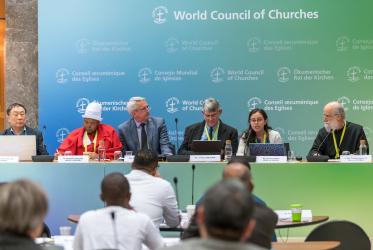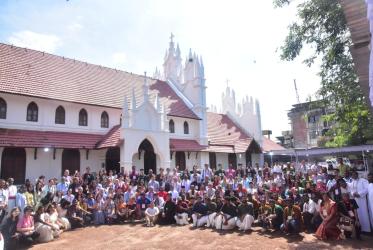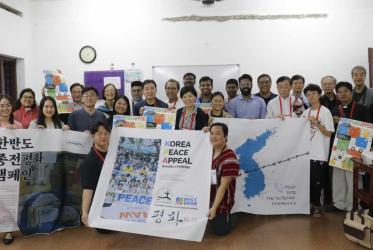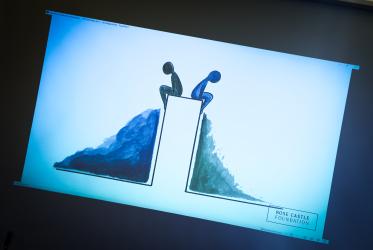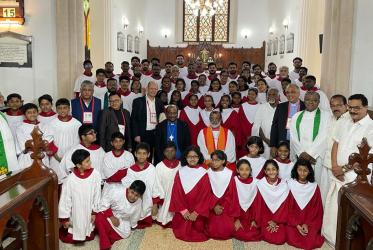EDAN-CCA workshop on Asian ecumenical process on life and peace for people with disability
Seoul, Korea, June 9-13, 2006
Being Inclusive Communities for All
Participating in Eco-Just Peace Movement
Background of the Workshop
Asia has had an extensive history of suffering and subjugation due to colonialism, war and currently neo-colonialism through economic and cultural globalization. Today, the cry for life in Asia has assumed new dimensions. Globalization, terrorism, ecological destruction and other structural forms of violence such as poverty, patriarchy, and racism pose new challenges for the Asian ecumenical movement. The new mandate of Christian Conference of Asia (CCA) for the coming years, that is from 2005 and 2010, : "Building Communities of Peace for All" warrants fresh approaches to diakonal ministry in Asia. Responding to this new contextual challenge, the CCA-JID as the responsible cluster within the CCA has launched the Asian Ecumenical Diakonia Process on Healing and Reconciliation (AEDP-HR). This program has been designed with a view to enhancing the Web of Life in Asia. Healing and Reconciliation which form the foundations of a Just and Peaceful community, will serve as its overall thematic focus of this program. Within this overarching process three integrated processes are envisaged:
-
Asian Ecumenical Process on Ecology and Health (AEP-EH). This component of the program deals with issues such as health, healing, wholeness, HIV/AIDS, and Tourism issues from a holistic perspective in order to enhance the wholeness of the earth household ( the oikoumene').
-
Asian Ecumenical Process on Life and Peace (AEP-LP) addresses concerns of the uprooted people, the indigenous people, people with disabilities with a specific focus on enhancing people's security and sovereignty for life and peace.
-
Asian Ecumenical Process on Alternative Communities (AEP-AC) focuses on issues of globalization, sustainable development, life-giving agriculture, regional, national and global solidarity for promoting sustainable local economy of life in the region.
Asian Ecumenical Process on Ecology and Health (AEP-EH). This component of the program deals with issues such as health, healing, wholeness, HIV/AIDS, and Tourism issues from a holistic perspective in order to enhance the wholeness of the earth household ( the oikoumene').
Asian Ecumenical Process on Life and Peace (AEP-LP) addresses concerns of the uprooted people, the indigenous people, people with disabilities with a specific focus on enhancing people's security and sovereignty for life and peace.
Asian Ecumenical Process on Alternative Communities (AEP-AC) focuses on issues of globalization, sustainable development, life-giving agriculture, regional, national and global solidarity for promoting sustainable local economy of life in the region.
In pursuit of these objectives and goals, CCA-JID organized two major workshops, prior to this. The first workshop, held in Bangkok (2003) came up with an ecumenical agenda for Churches to be in Solidarity with Persons with Disability. The second workshop which coincided with the CCA general assembly in Chiang Mai (2005) made significant paradigmatic shifts in disability discourse, the major ones being the shift of focus from independence versus dependence' model to a perspective of interdependence'; and moving beyond the inclusive communities' model to one which locates persons with disabilities as leaders of movements for eco-justice.
In continued search of this agenda, the current workshop on Asian Ecumenical Process on Life and Peace for People with Disability proposes to take further the process of translating the issues raised in the previous two workshops into concrete plans of action. The CCA, WCC-EDAN, and the National Council of Churches in Korea have come together in partnership to realize this vision.
37 participants from various Asian countries and Africa (Kenya) took part in the workshop which was held at the Luce Center for the Global Church, Presbyterian Theological Seminary, Seoul, Korea, from June 9-13, 2006. 12 delegates represented different Asian countries and the others were from Korea.
The Asian Context vis-à-vis Disability
The workshop received reports from various Asian countries that highlighted the problems the regions are faced with in terms of disability concerns. We were alerted to the fact that about 15-20 percent of poor people living in the developing world, suffer from some form of disability. 60 percent of the world's disabled people live in Asia. This is in comparison with 13% in Africa, 12% in Europe, 9% in Latin America, 5% in North America and 1% in the Pacific region. We have come to recognize that churches and governments in some Asian countries are more alert to this issue than others and that most countries have a long way to go in waking up to the reality of disability and the challenges it raises. We also acknowledged the importance of exchange programs among the region whereby those regions where lag behind in sensitivity and action could be exposed to those regions (for instance, Korea) where serious initiatives are being taken to address the issues of disability.
Biblical and Theological Foundations for Mission of People with Disabilities
We affirm that mission belongs to God and as God's creation, made in the divine image and likeness, people with disabilities too have an active role in God's mission. We find the Trinitarian, communitarian image of God more helpful than a singular, monarchical and transcendent notion of God, which has been instrumental in developing individualism. The Triune God is characterized by interdependence, not independence; by mutual inter-communion not exclusive isolation. In our pursuit of a model of interdependence to address disability concerns, the Trinitarian God who exemplifies interdependence within Godhead, provides us with a theological basis. St. Paul's presentation of the body (1Cor 12:21-27) as an image, also emphasizes the interdependent nature of humanity.
The Bible also presents God as a suffering servant, who takes part in the pain and pathos of the suffering people. The Cross of Jesus Christ symbolized his identification with the suffering, particularly the disabled people. On the Cross, he was utterly incapacitated. His Cross had no handle and therefore could be seen as a disabled' cross. The Nazareth Manifesto with which Jesus started his ministry (Lk.4:18-19) * with which Jesus commenced his ministry, with its radical implications for the disabled, challenges us to tread the prophetic path, to counter the structures of violence and injustice that cause disability. Jesus by healing (not merely curing) the disabled brought them to the mainstream of society, thus making them subjects of history, not mere objects of patronizing charity. The healing acts of Jesus had an earthly touch about them (for example the healing of the blind man in John 9), bringing out the eco-just dimension of mission. The missional vision of Jesus has been one of an inclusive community, where no one is excluded on the basis of class, caste, creed, gender, ability-disability, sexual orientation and so on. The divisive walls of separation have been dismantled once and for all by Jesus Christ on the Cross (Eph.2). As bearers of the disabled cross of Christ, we affirm that it is our mission to make sure the existing walls of discrimination both in the churches and society at large are removed.
On the basis of these Biblical and theological foundations, the workshop affirmed that people with disabilities, most of them being victims of structural violence such as war, ecological destruction through developmental' projects and so on, have the special privilege' vis-à-vis their suffering to be in the forefront of mass movements for peace, sustainability and eco-justice.
Defining features of the Movement of Persons with Disabilities
The workshop identified and defined two major dimensions of the movement of persons with disabilities. Under each section, the following concerns and programmatic areas of focus were listed.
1. Movement of People with Disabilities for Inclusive Communities
1.1 Awareness and Advocacy
- Empowerment of People with Disabilities
-
Building Public Awareness
-
Introduction of Policy Changes
-
Development of Mobility and Accessibility
-
Promotion of Bio-Ethics
1.2 Inclusive Faith-Based Communities
-
Promotion of Inclusive Policies, System and Facilities
-
Empowerment of Local Faith-Based Communities-in-Mission of People with Disabilities
-
Sharing of Resource with People with Disabilities
1.3 Children and Youth with Disabilities
-
Rights of Children and Youth with Disabilities
-
Equal Opportunity for Education
-
Enhancement of Working Capabilities
-
Life Education: Life Skills and Vision
-
Mentoring: Leadership Formation
-
Education on and dealing with Challenges of Globalization
1.4 Disabilities and Gender Justice
-
Rights and Dignity of Women with Disabilities
-
Violence against Women
-
Equal Opportunities for Health, Employment, Education and Full
-
Participation in the Decision Making Process
-
Empowerment of Political and Economic Power of Women with Disabilities
-
Parenting Skills
1.5 Aged People with Disabilities
-
Life Sustainability of Aged People with Disabilities
-
Rights and Dignity of Aged People with Disabilities
-
Inclusion of the Aged with Disabilities in Families and Societies
1.6 Families of/with People with Disabilities
-
Acceptance of Children's and Parents' Disabilities
-
Vicious Cycle of Poverty
-
Moral and Personal Support and Resource Sharing from Societies to Enhance Life Security and Quality of Families with People with Disabilities
-
Right of Information and Communication
-
Transferring Inputs from Families into Communities
-
Enhancement of Family Integrity
2. Eco-Just Peace Movement
2.1 Education on Healing and Reconciliation
-
Integration between Ecology and Health to Enhance the Wholeness of the Earth Household
-
Promotion of People's Safety and Sovereignty for Life and Peace
-
Empowerment of Local Economy of Life through Alternative Communities(for example, Eco-Just Peace Life-Giving Agriculture / Forest)
2.2 Advocacy on Eco-Just Peace
-
Campaign against Ecological Destruction and War on Terrorism
-
Participation in Local Environmental Planning and Developing Urban Ecology
-
Socialization of Ecological Principle - Interdependence - into Social Policy on People with Disabilities
2.3 Inter-Movement Solidarity
-
Alternatives to Globalization Movements
-
Human Rights Movements
-
Women's Movements
-
Environmental Movements
-
Health Movements
-
Peace Movements
-
Life-Giving Agriculture Movements
-
Movements in Solidarity with Indigenous People and Uprooted People
-
Inter-Faith Movements
Overall Strategies:
1. Education
-
Human Resource Development Program
-
Education in Local Churches and Seminaries
-
Education in Public Schools
-
Non-formal Education with Recognition from Institutions
-
Empowerment of Teachers for People with Disabilities
-
Independent Living Program on the Basis of Interdependence Paradigm
-
Curriculum Development of Inclusive Community Movement and Eco-Just Peace Movement
2. Leadership Formation
-
Ecumenical, Local and National Scholarships
-
Ecumenical Leadership Training Programs at Local, National and Regional Levels
-
Inter-Local Ecumenical Camp for Youth with Disabilities
3. Advocacy Campaign
-
Signature Movements
-
Multi-Media Campaign
-
Lobbying with Churches, Institutions, Local Governments and Parliaments
-
Co-operation with NGOs, INGOs and Civil Societies
4. Information, Communication and Fellowship
-
IT Accessibility of People with Disabilities
-
E-Communities, Website and Internet News
-
Publications
-
Mass Communication
-
Researches, Workshops and Consultations
-
Fellowships of Families of People with Disabilities
-
Fellowships of Local Partners for People with Disabilities
5. Inter-Contextual Exchange
-
Inter-Local Information Sharing
-
Ecumenical Solidarity Visitation
-
Inter-Local Solidarity and Resource Sharing
6. Networking
-
Cross-Disabilities Network
-
Interdisciplinary Network
-
Inter-Organizational Network
-
Inter-Faith Network
-
Inter-Local Network
7. People-Centered and Culture-Bound Monitoring System
-
Self-Monitoring System of Local People's Committee and Local Networks
-
Planning, Monitoring and Evaluation Process of Asian Ecumenical Working Group
Operational Structure of Network
The workshop, considering the depth and scope of the programe envisaged, proposed that an Asian Ecumenical Program Office be set up in Asia. It was also decided that this office would be located in Korea as Ms. LEE Ye Ja as Coordinator.
The main ecumenical co-operation would be between CCA, WCC-EDAN and NCC Korea. An Ecumenical Working Group on People with Disabilities was also appointed with the following as members:
-
Ms. LEE Ye Ja (Korea-Coordinator)
-
Rev. Ezamo Murry (India)
-
Ms. Sia Siew Chin (Malaysia)
-
Mr. LEE Hong Jong (Korea)
Ms. LEE Ye Ja, the Coordinator was authorized to co-opt two more members into the working group.
Recommendation
To Churches, CCA, WCC-EDAN:
It was recommended that the Asian Ecumenical Program of People with Disabilities be recognized and supported by CCA and WCC-EDAN and that common strategies and programs be worked out and network established by these ecumenical partners.

